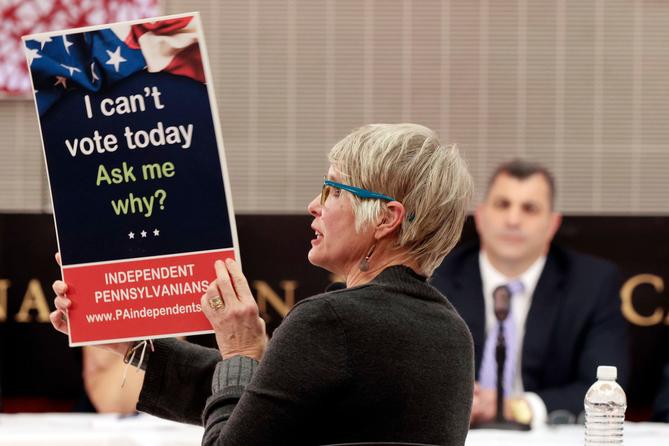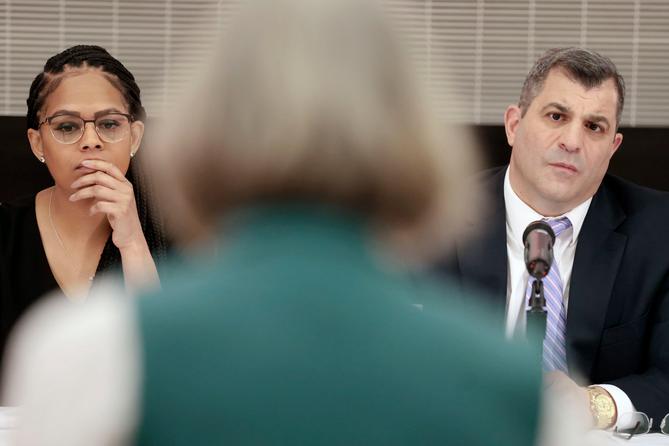Spotlight PA is an independent, nonpartisan newsroom powered by The Philadelphia Inquirer in partnership with PennLive/The Patriot-News, TribLIVE/Pittsburgh Tribune-Review, and WITF Public Media. Sign up for our free newsletters.
HARRISBURG — A statewide listening tour organized by embattled state House Speaker Mark Rozzi revealed widespread frustration with the lower chamber, which has been unable to move forward with official business amid a partisan stalemate.
Rozzi (D., Berks) scheduled the meetings to solicit feedback about the state House’s operating rules and give Pennsylvanians a rare opportunity to weigh in on the chamber’s internal functions.
Members of the public frequently criticized previous versions of the rules that have given the majority party outsized power to kill legislation that has bipartisan support.
Other testimony focused on issues beyond the rules, including the state’s closed primaries that exclude unaffiliated voters, and a growing reliance on constitutional amendments to advance policy goals without bipartisan cooperation.
The state House and Senate typically adopt rules at the beginning of each two-year legislative session. They establish the partisan makeup of a committee, the process by which a bill can be referred for a vote by the full chamber, and other critical details.
The state Senate adopted its rules in January, but the state House is currently deadlocked.
Democrats won more state House seats on Election Day, but three are currently vacant. The party will likely hold a one-vote majority after special elections are held in early February, and its leaders are pushing for rules that would benefit them.
Republicans, who hold a functional majority but face internal divisions over how to use it, are pushing for rules that would give the minority party more power over state House operations.
Amid the deadlock, Rozzi — who was elected speaker in a bipartisan vote that has since devolved into more infighting — announced he would hold the tour in a stated attempt to find “solutions to partisan gridlock.”
Over a two-week period, Rozzi held public listening sessions in Philadelphia, Pittsburgh, State College, and Wilkes-Barre. He was joined by a six-member bipartisan work group he formed to draft the rules.
Many who testified are not new to Harrisburg’s inner workings, or to the power that individual lawmakers can have to crush broadly popular policies.
Advocates from Fair Districts PA, which pushed for an independent redistricting commission, and members of the good-government group March on Harrisburg were well-represented at the hearings, as were supporters of a two-year window allowing survivors of sexual abuse to sue their perpetrators and those that shielded them. Many of the local residents unaffiliated with these groups who attended the hearings also pushed for similar changes.
Agenda fairness
There was one consistent priority among testifiers: taking away the power of committee chairs to unilaterally sink legislation they personally oppose.
Testifiers brought many examples of scuttled bills: a measure that aims to ease health care worker shortages by giving nurse practitioners more autonomy; another that would establish uniform rules for telehealth; a bill that would temporarily bar people experiencing mental health crises from accessing guns. These measures all had bipartisan support, but languished for years in the General Assembly, primarily because key committee chairs opposed them.
Chamber rules have historically given committee chairs total authority to decide which bills get a vote in their committee, and thereby make it to the full state House floor for consideration.
The decisions are often political: Some Republican chairs in recent sessions have bragged about blocking Democrats’ bills, or said legislation on certain subjects, like gun control or policing, would never leave their committees.
“That is not a committee chair, that is a tyrant,” Rachel Sorokin Goff, a retired physician from Montgomery County, said at the Philadelphia hearing.
While there is a procedure to advance a bill over the head of a committee chair known as a discharge petition, it is cumbersome to use and easily short-circuited. Republican chairs in recent years have amended or referred bills to another committee to block discharges.
“Please require committees to vote and report on all bipartisan bills,” Goff said. “If you have to limit the number of bills, so be it.”
Others suggested giving all 203 state House lawmakers the ability to name a piece of legislation a “priority bill” that would be guaranteed a hearing and an up or down vote in committee.
Suggestions for forcing more votes were not just limited to committees. Even if a bill makes it out of committee, the state House majority leader can keep it off the calendar indefinitely to prevent it from coming up for a vote.
“No leader should have the power to just veto a bill by just never putting it on an agenda,” said Shaler resident Connie Hester at the Pittsburgh meeting.
To fight this, testifiers called for state House rules to require floor votes on bills with bipartisan backing, including ones introduced in the state Senate.
Jordi Comas, a member of the Lewisburg Borough Council and progressive grassroots activist, said that such changes could also force legislators to answer for their decisions.
“I think it takes the minimum amount of courage to do our job to say why you voted against something,” said Comas. “Even if some people I represent would disagree with those decisions I make, it’s my job to explain to them and not hide behind the smoke and mirrors and party politics.”

Amendments and open primaries
While the listening sessions were intended to take the public’s temperature on rules changes in the state House, many attendees aired broader frustrations with Harrisburg politics.
They frequently mentioned constitutional amendments, which legislative Republicans have increasingly turned to in recent sessions to advance their priorities while bypassing a Democratic governor.
Amendments must pass the legislature with identical language in two consecutive sessions, before going to voters for a statewide referendum. The Department of State must also publicize the exact language of the amendment in at least two newspapers in each county.
Critically, the governor cannot veto amendments.
Kate Rothstein, a programming manager at the National Council of Jewish Women who spoke at the Pittsburgh session, said excessive amendments are “pernicious and damaging to our democratic values,” and constitute attempts to “supersede the legislative and judicial processes.”
These are timely concerns. In January, the state Senate passed a measure containing three unrelated constitutional amendments as one of its first actions of the new session.
One was a bipartisan measure that would temporarily extend the statute of limitations for survivors of childhood sexual abuse to sue their abusers. The others were GOP priorities: an expanded voter ID requirement, and an amendment that would make it easier for the legislature to override state regulations.
Several attendees at Rozzi’s listening sessions said the legislature’s recent actions have been painful for the survivors of sexual abuse who have waited for years for the statute of limitations amendment to go to voters. But their preferred solutions sometimes differed.
Donna Greco of the Pennsylvania Coalition Against Rape urged lawmakers to stop trying to attach unrelated amendments to the statute of limitations extension, and to pass it as a standalone measure.
Attendees also advocated for more autonomy for county governments, a gift ban in the legislature, and, repeatedly, open primaries.
Pennsylvania is one of nine states that has completely closed primaries, meaning voters who are not Democrats or Republicans are excluded from making candidate selections during spring elections. Independents now account for nearly 1.3 million registered voters in Pennsylvania — just under 15%.
Open primaries are a perennial topic of discussion in Harrisburg. In 2019, the state Senate voted 42-8 to pass a bill that would open primaries, but the measure died in the state House. Last session, two bills were introduced in both the state House and Senate to open primaries but neither made it to the floor of their chamber.
Speaking at the Philadelphia session, David Thornburgh, a senior advisor at the good-government group Committee of Seventy, linked the dysfunction of Harrisburg and its governing rules directly to Pennsylvania’s closed primaries.
Harrisburg’s hyperpartisanship “is fostered and bred in a system of primary elections that excluded 1.1 million people and elects people in low-turnout primaries that are often dominated by public interests,” said Thornburgh. “That’s not a formula for bipartisanship once you walk over the threshold of the state Capitol.”
Building a ‘culture of collaboration’
Although the state House operating rules are important, “they cannot guarantee a positive outcome on their own,” said Pat Christmas of the Committee of Seventy.
“The building and maintenance of relationships among lawmakers within and between their partisan caucuses is also essential,” Christmas, a policy analyst, said in Philadelphia.
Matching national trends around partisan polarization, Pennsylvania lawmakers and other Capitol insiders — including lobbyists, staff, and advocates — have frequently observed in recent years that there is less camaraderie in the building than there used to be.
Legislators used to count friends in both parties, and those relationships could sometimes be key to passing legislation on controversial topics such as election law or taxes. Now, those friendships have been largely replaced by no-holds-barred floor fights and partisan dunking on social media and in news releases.
Christmas encouraged more bipartisan dinners that could foster trust between lawmakers and, he hopes, “a culture of collaboration.”
He also pitched bipartisan statewide bus tours with a mix of new members and leadership, retreats, or sending groups of lawmakers on trips to other states for problem-solving inspiration as potential salves for partisan gridlock. He held up one existing tradition as a successful model: an annual softball game played between two bipartisan teams of lawmakers, which raises funds for a Harrisburg food bank.
By building those connections, Christmas argued, the legislative body could “engender the trust and civility that allows for individuals with different life experiences, ideologies, and viewpoints to sit across from each other and to work to find common ground, acknowledge points of disagreement, and, where necessary, compromise to make forward progress on any given issue.”
The state House is scheduled to return to Harrisburg on Feb. 27, when it will likely swear in the winners of three Feb. 7 special elections in Allegheny County that will decide which party controls the chamber. Democrats are heavily favored to win those races.
At that time, the state House could adopt rules with a majority vote.
The Democratic caucus has not publicly released a proposed rules package. Their GOP counterparts have proposed rules that would strengthen discharge resolutions, require lawmakers to post their legislative expenses online, and create a 13-12 partisan split on committees — rather than a 15-10 split that heavily benefits the majority party.
The changes proposed by the GOP would empower the minority party, which will likely be Republicans by mid-February. While holding the majority over the past 12 years, the GOP repeatedly rejected similar changes. A state House Republican spokesperson previously told Spotlight PA that the rules “reflect the current legislative reality, as they have in the past sessions.”
Rozzi said he expects to release his own version of the rules after listening sessions end, but he has not laid out a specific timeline.
After the final hearing Thursday, Rozzi said his bipartisan workgroup would head back to Harrisburg with the goal of bringing the state House back to session as soon as possible.
“I want to get the House back up and running,” said Rozzi. “But like I said from day one, it’s going to be something that the people — all 13 million residents of this Commonwealth — can be proud of, not politicians.”
WHILE YOU’RE HERE… If you learned something from this story, pay it forward and become a member of Spotlight PA so someone else can in the future at spotlightpa.org/donate. Spotlight PA is funded by foundations and readers like you who are committed to accountability journalism that gets results.

